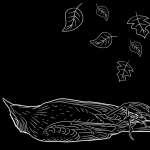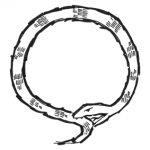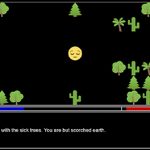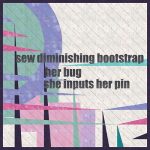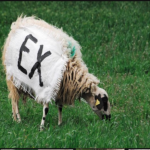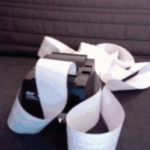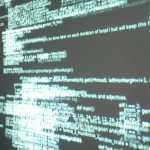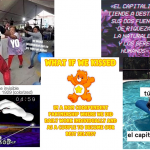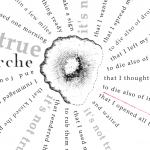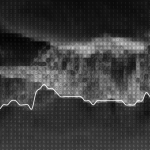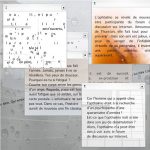Delirium, Disruption and Death: On Stéphane Vanderhaeghe’s Charøgnards (Quidam éditeur, 2015).
Greg HaingeWhilst reading Stéphane Vanderhaeghe’s dystopian fiction and touching on Bernard Stiegler's Age of Disruption, Greg Hainge explores the world that now reads us via a universal digitisation.
Embraceable Joe: Notes on Joe Brainard’s Art
Wojciech DrągA comprehensive summary of a career that, unlike those of Warhol, Lichtenstein, Katz or most other contemporaries, lets us recognize Joe Brainard as an antecedent of our current, dispersed and all-embracing digital arts practices. As Nathan Kernan argues in 2019, our multimodal online habitus “looks more and more like a Joe Brainard world.” Wojciech Drąg takes us further into Brainard's lifelong refusal of artistic grandeur. An aesthetic of visual attention that purifies objects and pieces of writing where Brainard wonders if he can ¨get by without saying anything.¨
Pitching the Poem-essay: Subversive Argument in the Work of Charles Bernstein
Hazel SmithCircularity, performativity, authorial intervention, digressions, interruptions, collage, segmentation, prolific examples, line breaks and humor: Hazel Smith brings each of these approaches and stances to bear on Charles Bernstein's poetic essays and essayistic poetry. In the spirit of which, Smith presents her own essay in parallel sections. The main column advances her critical argument, while the second discontinuous column presents a "Deep Text" generated by Roger Dean, who applied the computer platform Python to word sequences from Smith's first column.
image: Charles Bernstein
In Defense of the Difficult
Eugenio Tisselli, Rui TorresTorres and Tisseli ask, isn't it ironic how, as we build machines that mimic thought and language in ever more persuasive ways, the very energy that fuels those machines is making us ever more stupid? Further, by resisting the proprietary technologies commonly present in 3rd generation e-literature, the co-authors advance the notion that being peripheral may actually be the role of e-literature.
Greening the Digital Muse: An Ecocritical Examination of Contemporary Digital Art and Literature
Paulo Silva PereiraBy now, Cultural Ecology, Ecocriticism, and Environmental Humanities can tell us all we need to know about climate change. What's still needed, however, is for authors and artists to reconceptualize environmental issues as social and human questions rather than mere technical ones.
Re:traced Threads: Generating Feminist Textile Art with Tracery
Anastasia SalterOn feminist futures of electronic literature (and interactive narrative, more broadly construed).
Po/ética Trashumante y Resistencia en Dos Proyectos Digitales: de Negro en ovejas a Emblem/as
Tina EscajaElaborating on interspecies and translab experimentation. Escaja's interactive digital arts projects reclaim the notion of “transhumant,” a single term for nomadic practices that are shared by both the livestock and its shepherd. Both projects, Negro en ovejas (ovine poem) and Emblem/as, prioritize dislocation and nomadic multiplicity, which constitute a basis for resistance to and reconsideration of monolithic notions and canonical impositions.
#PEAE Participative Ethology in Artificial Environments
Annie AbrahamsAnnie Abrahams reflects on the right classification of her own ... what, exactly? Hypertext work? Net Art, electronic literature, digital art, intermedia art, computer fine arts, internet art, interactive writing experiment, computer art, poetry, flash art, animation, hypermedia, lecture, digital print, performance, opera, sound piece, contemporary art, video art? Rather than settle on tags that were mostly based on technology and didn't say anything about what was experienced through the work, Abrahams now profers a behavioral art that considers human/machine interactions somewhat in the way behavioral science in the 1970s "studied monkey behavior in a cage."
Data-Realism: Reading and Writing Datafied Text
Malthe Stavning Erslev, Søren Bro PoldPold and Erslev explore third-wave electronic literature -- a practice situated in ¨social media networks, apps, mobile and touchscreen devices, and Web API services” (Flores). At the next conceptual level, however, literary practices of this kind unavoidably take part in representing and reconstructing the metainterface - a space of data collection, standardization, commodification and redistribution that, for better or worse, is our context for a contemporary data realism.
The Anxiety of Imitation: On the “Boringness" of Creative Turing Tests
Dan Rockmore, Kyle BootenThe authors speculate why some are bored by the goal of computational generation of "human-like" text. Inspired by Italo Calvino's alternative, minor strain in "Cybernetics and Ghosts," they argue that this kind of text generation provides an opportunity to destabilize as well as refine our sense of the differences between human and machine cognition.
Is Third Generation Literature Postweb Literature? And Why Should We Care?
Alex Saum-PascualAlex Saum-Pascual on e-lit's relocation to platforms with massive user bases, and the beauty of meh.
To Hide a Leaf: Reading-machine for a Book of Sand
Andy Simionato, Karen Ann DonnachieWorking with a custom-coded, automated-art-system of their own devising, Australian digital artists Karen Ann Donnachie and Andy Simionato have now archived a literary corpus for future study in what they have called The Library of Nonhuman Books. Yet it remains uncertain whether human scholars will visit Donnachie's and Simoniato's virtual library. Seeing as how "there are no human ‘typewriters’ now, how can we be sure there will still be human ‘readers’ in the future?"
Grappling With the Actual: Writing on the Periphery of the Real
J. R. CarpenterLike many of the "Artistic Reflections" featured in the Cork 2019 e-lit conference, Carpenter's opens out from her own web based works to a "post-digital world, in which invisible layers of data inform our daily thoughts and actions; a post-human world, of vast oceans and ceaseless winds."
Electronic Literature in the Anthropocene
Richard A. CarterFollowing the work of Jennifer Gabrys (in Program Earth), Carter contends that electronic literature has the potential to function as a mode of experimental sense-making. By exploring works by Tina Escaja, Mark Sample, and J. R. Carpenter, Carter reveals the limits and potentials of our data-driven epistemes - to expose that which goes unseen, and highlight its significance for how we come to know and respond to the challenges ahead.
The Digital Subject: From Narrative Identity to Poetic Identity?
Serge Bouchardon, Ariane MayerBouchardon and Mayer in this essay question the narrative model of personal identity – the idea of the self as a story – in light of contemporary forms of electronic literature.
